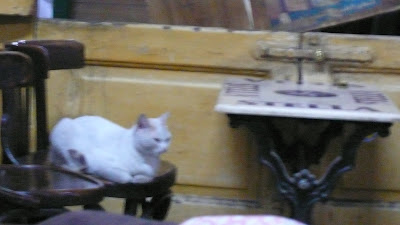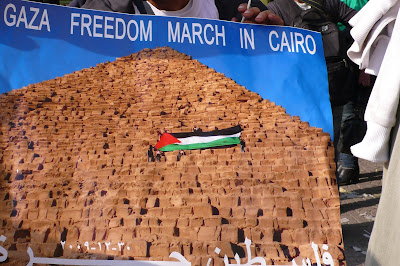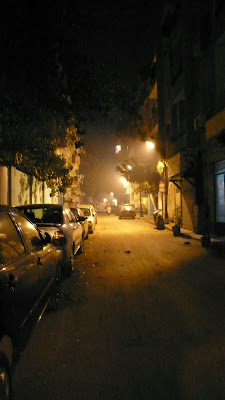
Wednesday 27 January 2010
Guide to being [really] Arab: Cross Cut like an immigrant

Tuesday 19 January 2010
Qu'il repose en paix
Sunday 17 January 2010
One. Un. Wahad.
Friday 15 January 2010
Dear Mindelle Jacobs,

you write for a newspaper that isn't even legitimate, for that, I forgive you. However, if you're about to call yourself a journalist, you need to learn some journalistic integrity when garbage like this article of yours gets published. With that being said, I'm going to provide you with a free history lesson on Palestine, which by the way, exists and has much more history than those 30 years you're claiming girl (do you kiss your mother with that mouth that spreads such false allegations?). Research your facts. Just because you write for the Sun and probably The National Post doesn't mean everything flies.
- 1000 BC: Israelite conquest of Canaan
- 965-928BC: King Solomon constructs first temple in Jerusalem
- 606 BC - 537 BC: Kingdom of Judah defeated by the Babylonians. Destruction of the first temple and deportation of some of the inhabitants. Cyrus the Great conquers Babylon and creates the Persian Empire, allowing Israelites to return and rebuild the temple.
- 333 BC: Alexander the Great conquers Persia. Palestine comes under Macedonian rule.
- 63 BC: Incorporation of Palestine into the Roman Empire
- 70 AD: Jewish revolt against the Roman Empire is put down and the second temple is destroyed, leading to the exile of Jews out of Palestine in 135AD. The Romans name the province "Syria Palaestina". At the time of the exile, 3/4 of the world's Jewish population was living outside of Palestine.
- 628-638 AD: Byzantine Christians rule Jerusalem
- 638-1072 AD: Caliph Omar Ibn Khattab conquers Jerusalem and establishes Muslim rule. Jews are allowed to return.
- 15th century to 19th century: Palestine under Ottoman rule. The term "Land of Palestine" was used to refer to Palestine.
- 1896: Zionist leader Theodor Herzl publishes "Der Judenstaat", advocating the creation of a Jewish state in either Argentina or Palestine.
- 1897: First Zionist congress issues the Basle Program "calling for a home for the Jewish people in Palestine" and establishes the World Zionist Organization to that end.
- 1900: Keren Keyemeth (Jewish National Fund) founded as land-acquisition organ of WZO with the function of acquiring land in Palestine to be inalienably Jewish with exclusively Jewish labour employed on it.
- May 16, 1916: Sykes-Picot agreement signed, dividing Arab provinces and countries of Ottoman Empire under French and British rule.
- 1917: British Foreign Secretary Balfour sends a letter (the Balfour Declaration) to Baron Rothschild pledging British support for the establishment of a Jewish home in Palestine, specifying that nothing should be done that "may prejudice the civil and religious rights of existing non-Jewish communities in Palestine." Allenby's troops occupy most of Palestine and enter Jerusalem and Damascus.
- 1918-1920: British military rule in Palestine.
- 1936-1939: The Arab revolt against the British occupation
- 1882-1939: Several mass Jewish migrations bring the total of the Jewish population from less than 3% to 30%, with Jewish land ownership rising to 5.7%.
- Nov 29, 1947: UN Partition Resolution 181: The UN general assembly votes on an amended partition plan calling for 60% of Palestine to be attributed to a Jewish state, when Jews totaled only 31% of the population, and 40% for the creation of a Palestinian state, whose population made up 69% of the total population. It was recommended that Jaffa be part of the proposed Palestinian state and that Jerusalem and Bethlehem would be under international control administered by the Trusteeship Council on behalf of the UN.
- 1947-1949: Zionist organizations Irgun and Haganah execute widespread internal and external ethnic cleansing of Palestinian villages, displacing over 700,000 Palestinians.
- May 15, 1948: The British Mandate ends. 4pm in Tel Aviv, an Israeli state is declared.
- June, 1967: Six Day War, The Israeli military occupies the West Bank and Gaza Strip in Palestine, Sinai in Egypt, and Golan Heights in Syria. 200,000 new Palestinian refugees; Resolution 242 adopted by the UN Security Council
- oh Mindelle, there's so much more
So you see, dearest Mindelle, there is an entity called Palestine and Palestinians did not suddenly become a people several decades ago, they've been around a long time, and yes Palestine was a country. You may only have heard of them a few decades ago when they started taking up more air time on the news, but they've always been there. Parts of that land they call Palestine is now called Israel (see timeline for details on this) and other parts of it are also occupied by Israel (you know Gaza, West Bank, see timeline again). You ever sat and wondered why the Muslim world has been hostile to Israel's existence? Maybe because of how it came to exist, not because of anti-semitism. Read up on history, you'll see that in many places, Jews, Muslims and Christians co-existed, including within Palestine. Everything is sourced below, MLA style. The timeline I gave you is also shortened, you may want to click here and here for more.
Love love,
The Yuppie Activist
Sources:
- Kayyali, A. W. Palestine a Modern History. 11th ed (Arabic version). The Arab Foundation for Studies and Publication: Beirut, 1999. Print.
- Pappe, Ilan. A History of Modern Palestine. 2nd ed. Cambridge University Press: United States of America, 2006. Print.
- "Palestine Chronology." passia.org. Palestinian Academic Society for the Study of International Affairs, n.d. Web. 15 Jan. 2010.
- "Jerusalem Chronology." passia.org. Palestinian Academic Society for the Study of International Affairs, n.d. Web. 15 Jan. 2010.
- Marcy Newman. "Palestine-map-2004.jpg". Body on the Line. Apr. 2009. Web. 15 Jan. 2010.
Thursday 14 January 2010
Notes from Egypt
- We realized that no matter what country you are from, you are "ahsan nas" (the best people) according to Egyptians. We also noticed that Egyptians cannot tell the difference between the Syrian, Palestinian or Lebanese accent and requested that we speak in the Egyptian dialect because they were having troubling understanding us. Hehe.
- Furthermore, Egyptian stray cats are much healthier than the ones in other Arab countries.
- The Alexandria library, despite being huge, is missing books. Where are they?


People who don't smoke will start smoking. Except this guy, he's a smoker.
- We signed a declaration, one you should sign too. DO IT, THE YUPPIE COMMANDS YOU!
- I'm a different type of "tourist." I don't really look up places to go visit them, I hear about things, remember places I read about (various mosques, libraries), I see things while in the taxi (Ottoman era Mohammed Ali mosque) and then I want to go discover them. In nine days, I managed to see practically all the historical aspects Egypt has to offer. Of all the places I went to see, I paid the foreigner price once (at the pyramids), otherwise, it was local and Arab people prices (which do not exceed 2EGP). Furthermore, I was able to never get ripped off in a cab again.
- We sang "El Hantour" one too many times (dirigin dirigin), we played George Wassouf to the police, and we performed versions of "Linda, Linda".
Tuesday 12 January 2010
Palestinian territories on Google Analytics


Monday 11 January 2010
The Fatimids

Shrine of Hussein, popular belief is that Hussein's head had been brought here after he was killed at Karbala (Hourani124).


Floor plan of Al-Azhar mosque in The Muslim Architecture of Egypt by K.A.C. Creswell, Alexandria library


Conversations with papa
"Excuse me?" I respond.
"You know, facebook?"
"Dad, seriously?" I ask.
"And your sisters, they also requested friendships from you."
"No I had one of them on there and she removed me," I say.
"How come?"
"If that happens I'd really rather you end up in an Israeli jail than an Arab jail. The Israeli jail is like five star compared to the Arab one, and there's more chances of you getting out," he responds.
"So you wouldn't be mad?"
"No, I'd go kill the leader of the country that arrested you."
"It would be pretty cool if I got arrested though," I say.
"Yeah, it would be."
I love you too baba.
Wednesday 6 January 2010
Omm il donia








































































